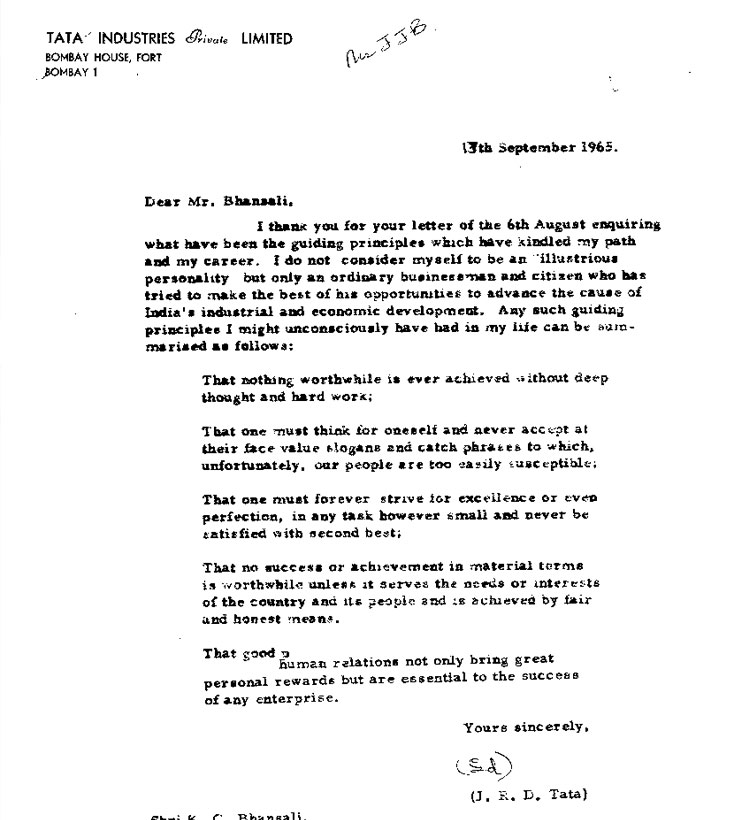In the year 1965, KC Bhansali, a school teacher from Kolkata, wrote a letter to then-Tata Group chairman JRD Tata.
In the letter, Bhansali had asked the legendary businessman about the principles that had governed his life. Later that year, he received a reply — not a token response but a detailed, well-thought-out response. As per the Tata historians, JRD Tata himself wrote the letter and did not ask any of his officers to do so, as many might assume.
Here is what the industrialist wrote:
“Dear Mr Bhansali,
I thank you for your letter of the 6th August, enquiring what have been the guiding principles which have kindled my path and my career. I do not consider myself to be an "illustrious personality", but only an ordinary businessman and citizen who has tried to make the best of his opportunities to advance the cause of India's industrial and economic development. Any such guiding principles I might unconsciously have had in my life can be summarized as follows:
That nothing worthwhile is ever achieved without deep thought and hard work;
That one must think for oneself and never accept at their face value slogans and catch phrases to which, unfortunately, our people are too easily susceptible;
That one must forever strive for excellence, or even perfection, in any task however small, and never be satisfied with the second best;
That no success or achievement in material terms is worthwhile, unless it serves the needs or interests of the country and its people, and is achieved by fair and honest means;
“That no success or achievement in material terms is worthwhile, unless it serves the needs or interests of the country and its people, and is achieved by fair and honest means”
That good human relations not only bring great personal rewards but are essential to the success of any enterprise.
Yours sincerely,
JRD Tata"

The letter reveals a lot about the kind of leader JRD Tata was and showcases the simplicity and humble nature of one of the most prominent industrialists of modern India.
JRD Tata was elevated to the top post in the Tata group in 1938, taking over as Chairman from Nowroji Saklatvala, he was the youngest member of the Tata Sons board. Over the next 50 years under his stewardship, the group expanded into chemicals, automobiles, tea and information technology. He passed away in a Geneva hospital on November 29, 1993.
Read Next: Why Do Trucks Say ‘Horn OK Please’? Wild Theory Suggests There’s A Tata Group Connection
Feature picture courtesy: Tata Central Archives
Source: Harish Bhat’s write-up from 2020. Bhat is the author of several books including Tatalog: Eight Modern Stories from a Timeless Institution.
Disclaimer: This content was partially produced with the help of Benzinga Neuro and was reviewed and published by Benzinga editors.
Don't miss a beat on the share market. Get real-time updates on top stock movers and trading ideas on Benzinga India Telegram channel.
© 2025 Benzinga.com. Benzinga does not provide investment advice. All rights reserved.